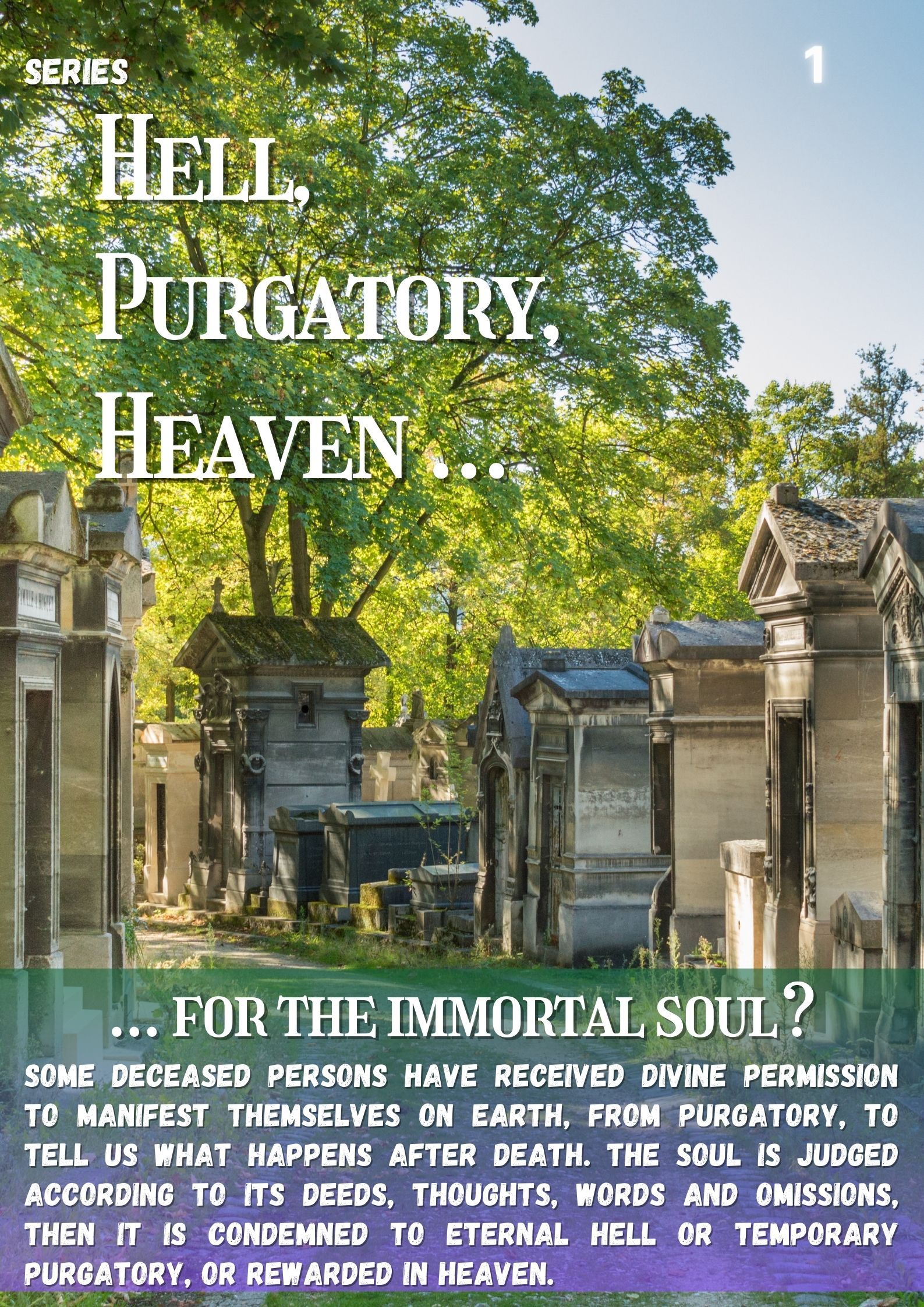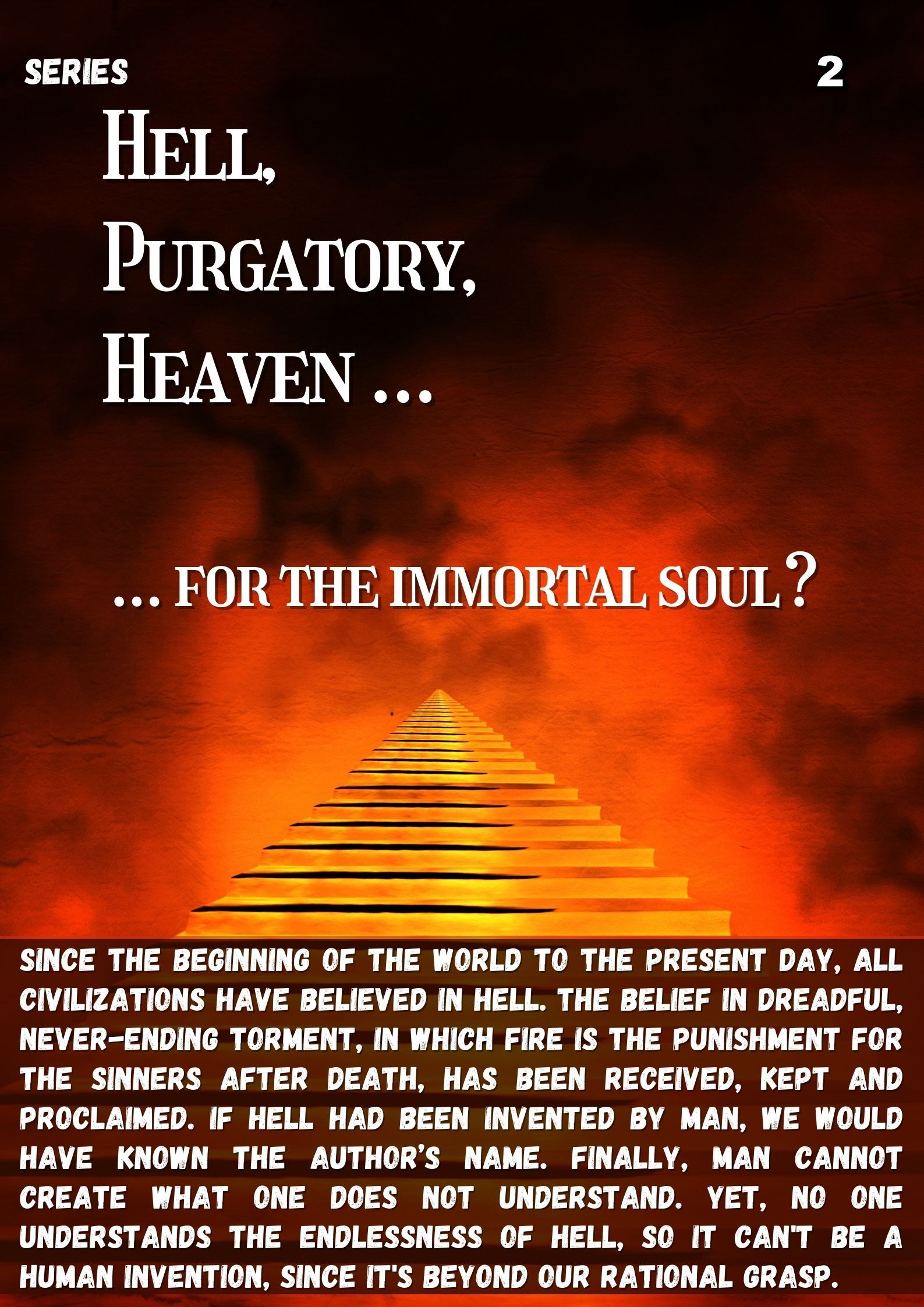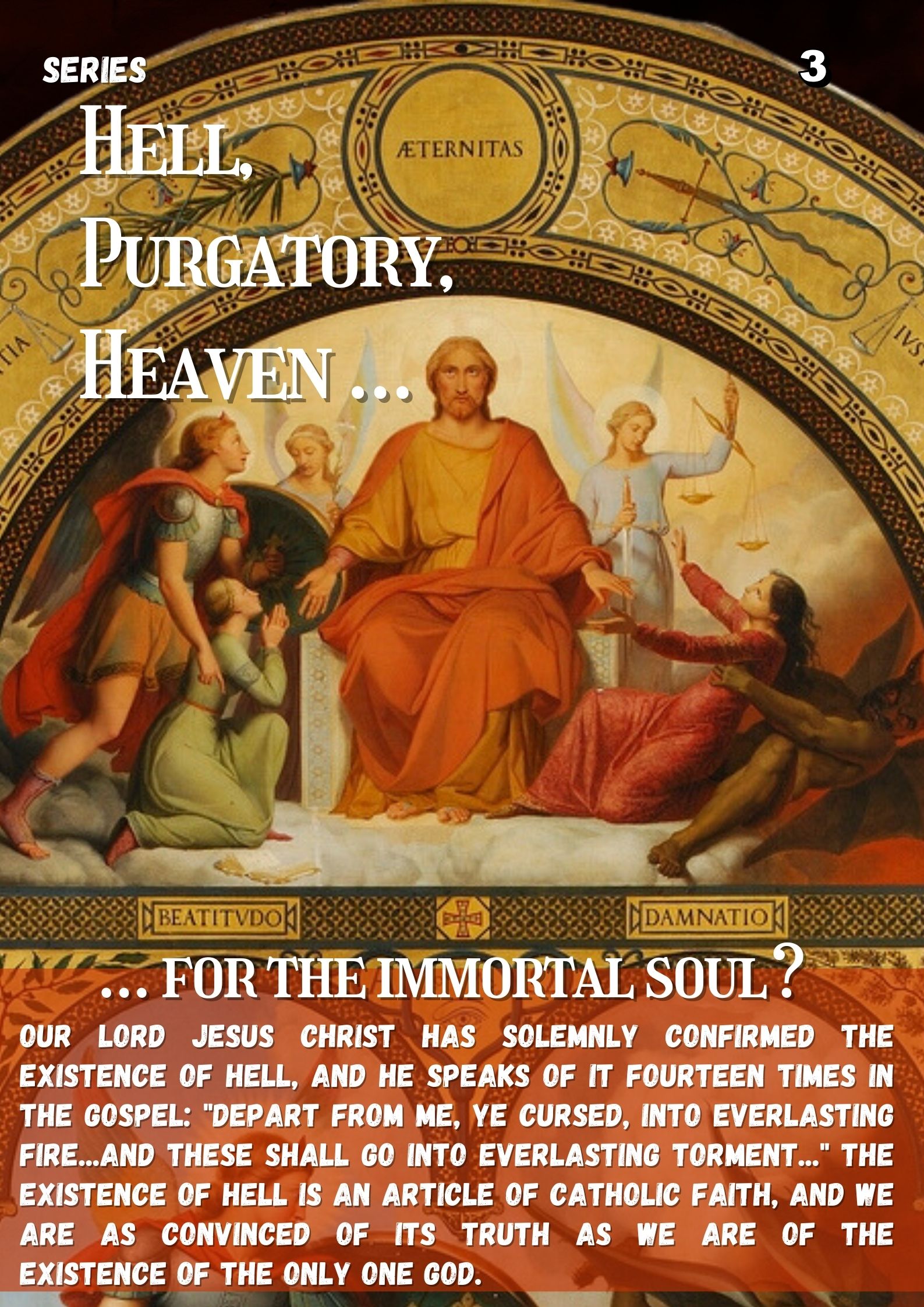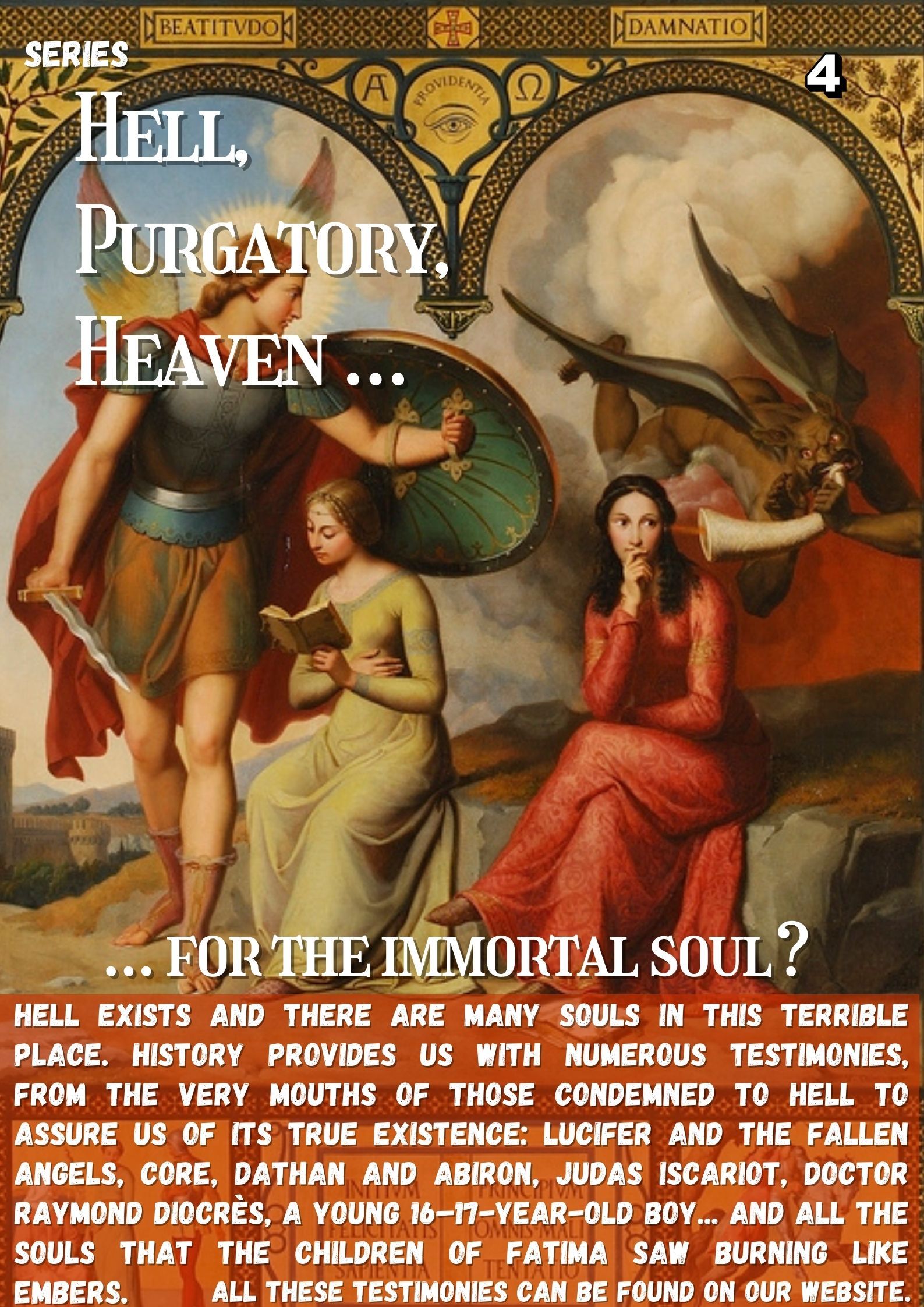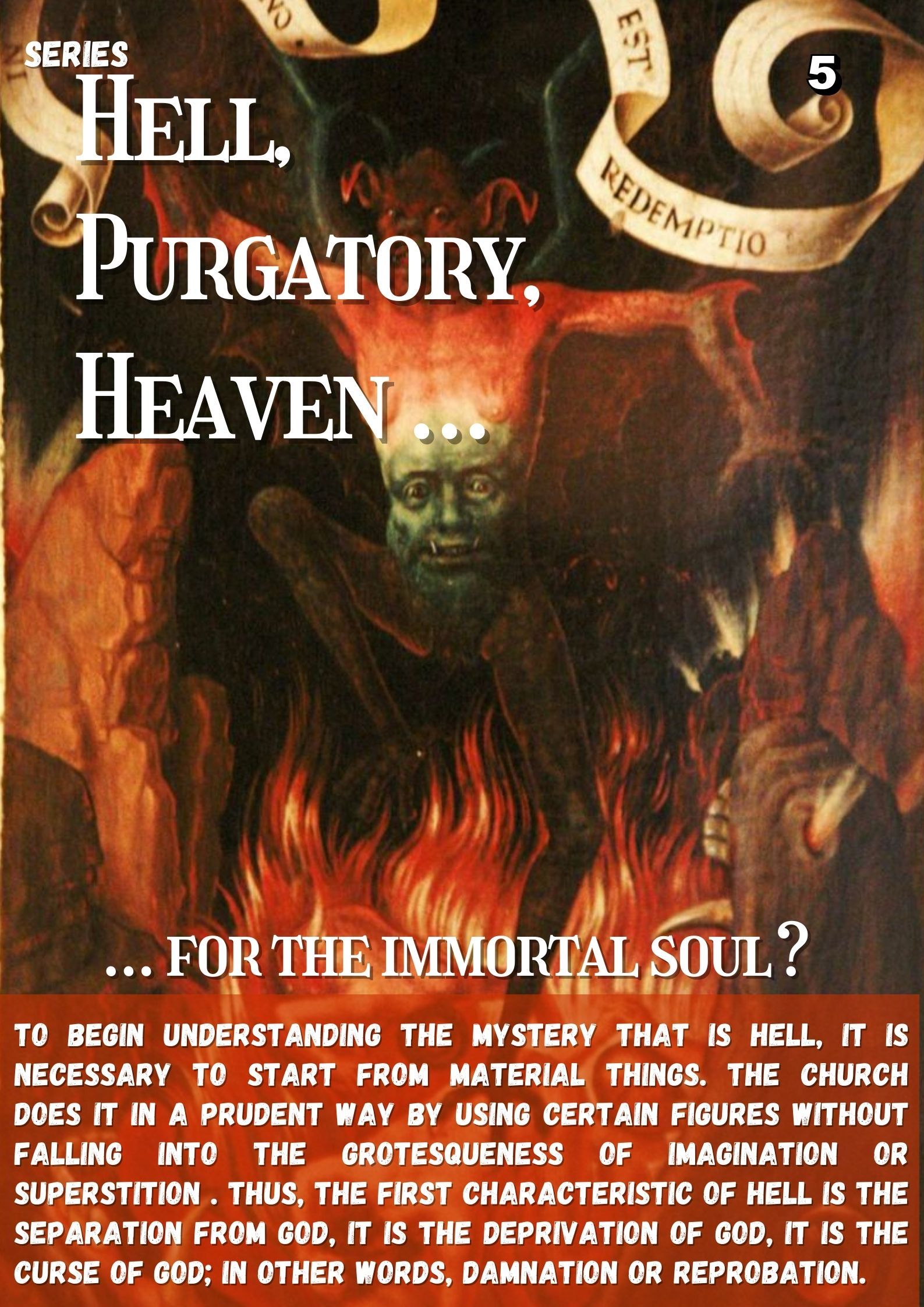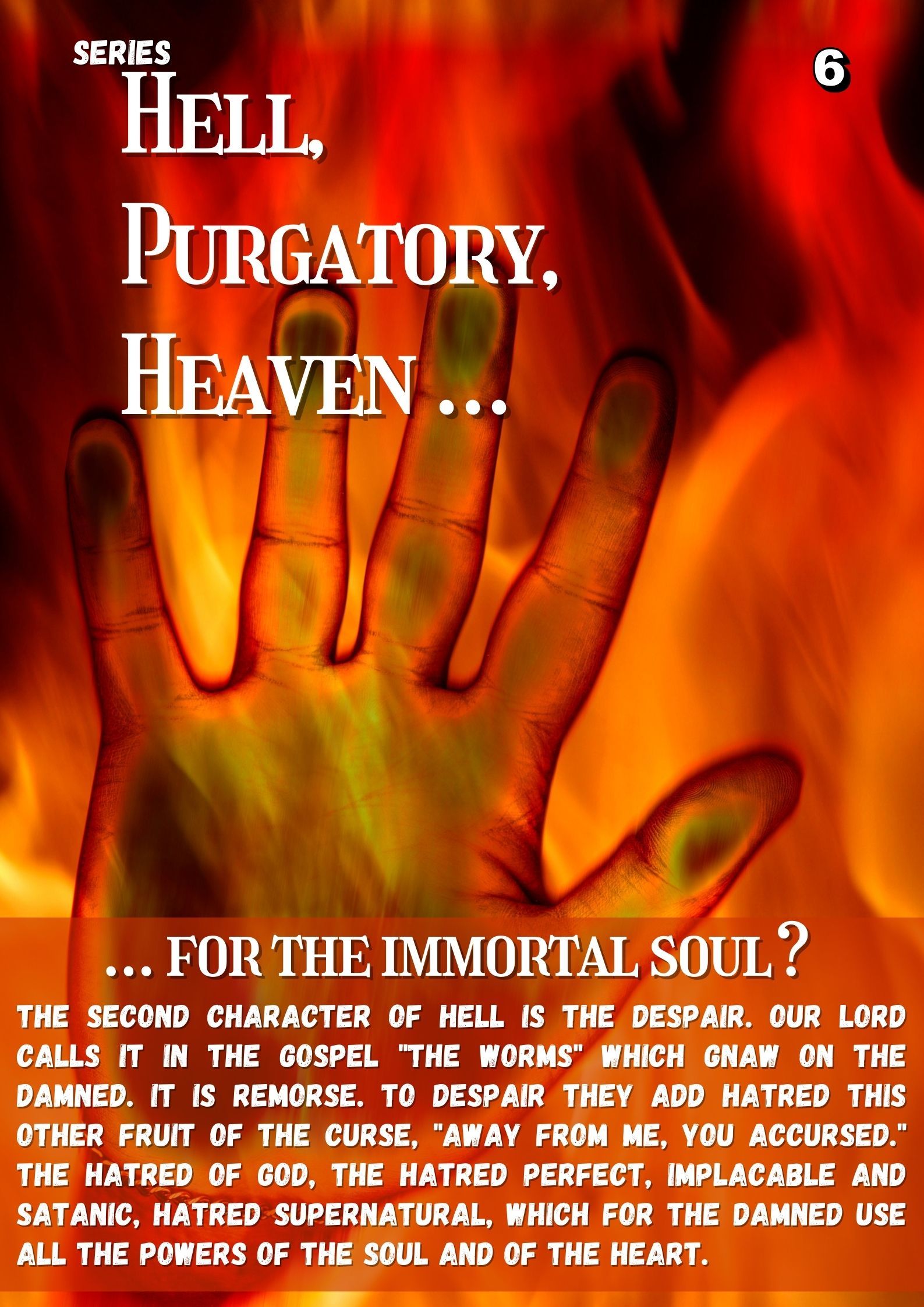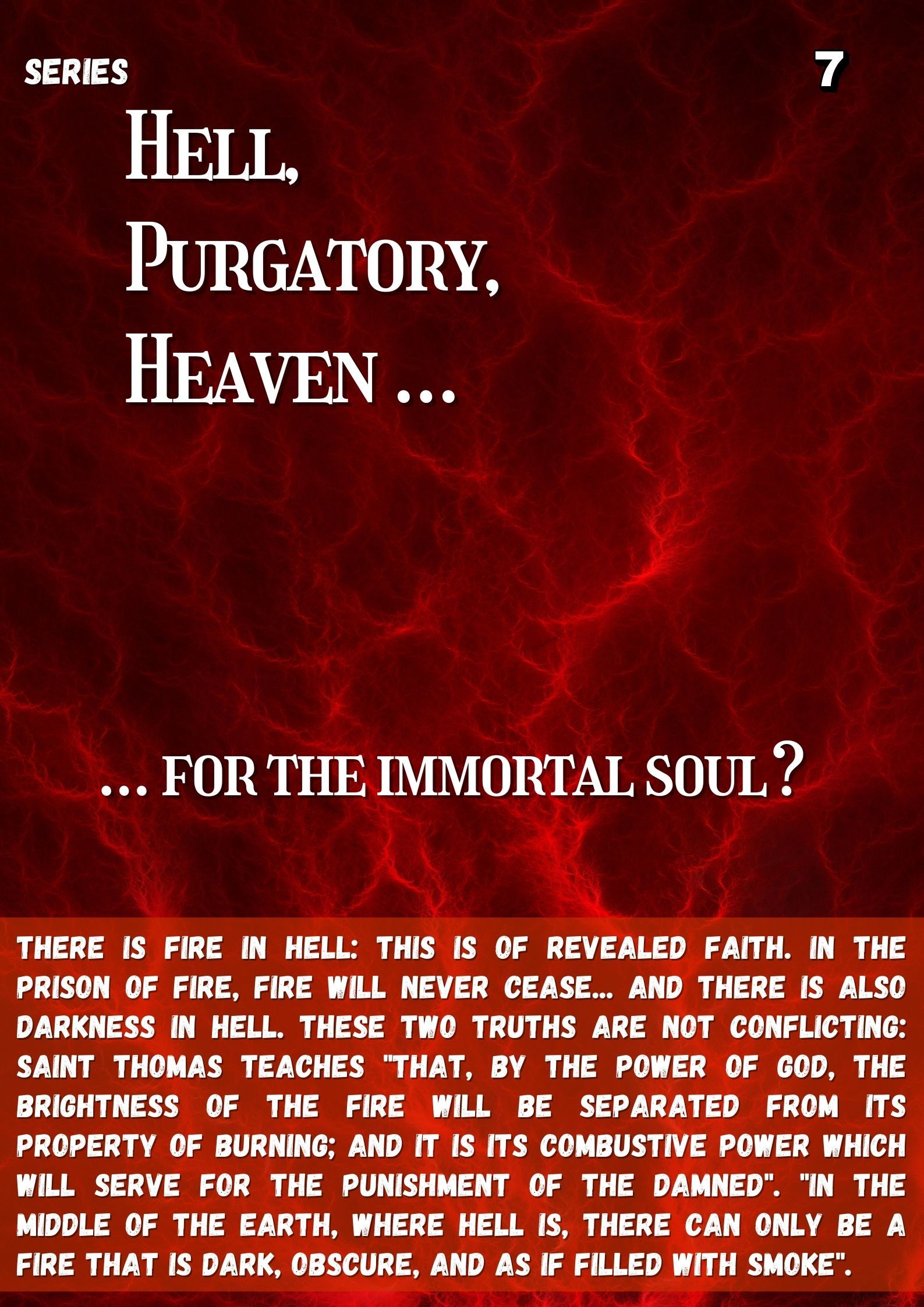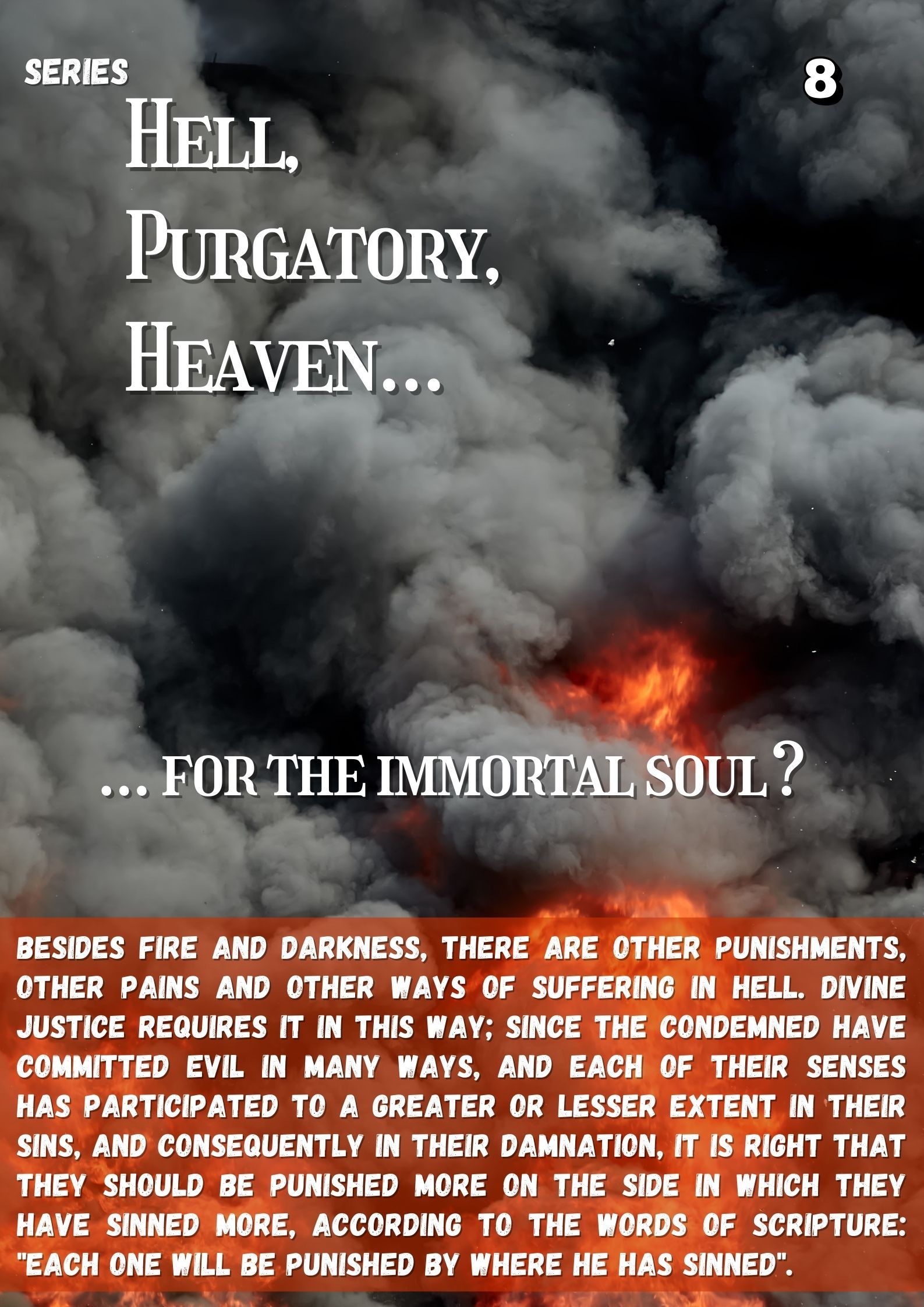Ave Maria! During these 8 days of prayers and petitions for the souls of the faithful departed and the deliverance of the souls in Purgatory, we propose to you a new series of cards that you can send around you. The theme of the series is “Hell, Purgatory, Paradise for the immortal soul?” We will give the definitions of these three words and a short description of these places so that souls helped by grace can be motivated to change their lives and may reach Eternal Life through the Immaculata.
In Corde Mariæ!
#militiaimmaculatae #apostolate #mi #marysworkshop #militiaimmaculataeen #mission #lifeafterdeath #november2023 #deceased #hell #purgatory #heaven
Every day, with each virtual card, we add true stories from Mgr de Ségur’s book on Hell.
Hell in the New Testament
Saint Matthew chap. 5, 21-22 / 29-30 – chap. 8, 11-12 – chap. 10, 28 – chap. 25, 30-41 and 46
“You have heard that it was said to them of old: Thou shalt not kill. And whosoever shall kill shall be in danger of the judgment. But I say to you, that whosoever is angry with his brother, shall be in danger of the judgment. And whosoever shall say to his brother, Raca, shall be in danger of the council. And whosoever shall say, Thou Fool, shall be in danger of hell fire.” (commentary : “Thou fool”: This was then looked upon as a heinous injury, when uttered with contempt, spite, or malice: and therefore is here so severely condemned. Shall be in danger of hell fire– literally, according to the Greek, shall deserve to be cast into the Gehenna of fire. Which words our Saviour made use of to express the fire and punishments of hell.)
“And if thy right eye scandalize thee, pluck it out and cast it from thee. For it is expedient for thee that one of thy members should perish, rather than that thy whole body be cast into hell. And if thy right hand scandalize thee, cut it off, and cast it from thee: for it is expedient for thee that one of thy members should perish, rather than that thy whole body be cast into hell.“
“And I say to you that many shall come from the east and the west, and shall sit down with Abraham, and Isaac, and Jacob in the kingdom of heaven: But the children of the kingdom shall be cast out into the exterior darkness: there shall be weeping and gnashing of teeth.”
“And fear ye not them that kill the body, and are not able to kill the soul: but rather fear him that can destroy both soul and body in hell.”
“And the unprofitable servant cast ye out into the exterior darkness. There shall be weeping and gnashing of teeth. And when the Son of man shall come in his majesty, and all the angels with him, then shall he sit upon the seat of his majesty. And all nations shall be gathered together before him, and he shall separate them one from another, as the shepherd separateth the sheep from the goats: And he shall set the sheep on his right hand, but the goats on his left. Then shall the king say to them that shall be on his right hand: Come, ye blessed of my Father, possess you the kingdom prepared for you from the foundation of the world. For I was hungry, and you gave me to eat; I was thirsty, and you gave me to drink; I was a stranger, and you took me in: Naked, and you covered me: sick, and you visited me: I was in prison, and you came to me. Then shall the just answer him, saying: Lord, when did we see thee hungry, and fed thee; thirsty, and gave thee drink? And when did we see thee a stranger, and took thee in? or naked, and covered thee? Or when did we see thee sick or in prison, and came to thee? And the king answering, shall say to them: Amen I say to you, as long as you did it to one of these my least brethren, you did it to me. Then he shall say to them also that shall be on his left hand: Depart from me, you cursed, into everlasting fire which was prepared for the devil and his angels.”…”And these shall go into everlasting punishment: but the just, into life everlasting.”
Saint Mark, 9, 42-48
And if thy hand scandalize thee, cut it off: it is better for thee to enter into life, maimed, than having two hands to go into hell, into unquenchable fire: Where their worm dieth not, and the fire is not extinguished. And if thy foot scandalize thee, cut it off. It is better for thee to enter lame into life everlasting, than having two feet, to be cast into the hell of unquenchable fire: Where their worm dieth not, and the fire is not extinguished. And if thy eye scandalize thee, pluck it out. It is better for thee with one eye to enter into the kingdom of God, than having two eyes to be cast into the hell of fire: Where their worm dieth not, and the fire is not extinguished. For every one shall be salted with fire: and every victim shall be salted with salt.
Saint Luke chap. 12, 5 — chap. 13, 24-28
“But I will shew you whom you shall fear: fear ye him, who after he hath killed, hath power to cast into hell. Yea, I say to you, fear him.”
“Strive to enter by the narrow gate; for many, I say to you, shall seek to enter, and shall not be able. But when the master of the house shall be gone in, and shall shut the door, you shall begin to stand without, and knock at the door, saying: Lord, open to us. And he answering, shall say to you: I know you not, whence you are. (Comment: “Shall seek”: Shall desire to be saved; but for want of taking sufficient pains, and being thoroughly in earnest, shall not attain to it.) Then you shall begin to say: We have eaten and drunk in thy presence, and thou hast taught in our streets. And he shall say to you: I know you not, whence you are: depart from me, all ye workers of iniquity. There shall be weeping and gnashing of teeth, when you shall see Abraham and Isaac and Jacob, and all the prophets, in the kingdom of God, and you yourselves thrust out.”
What if the damned came back to earth to tell us what hell is like?
“One day Our Lord was passing through Jerusalem, near a house whose foundations still exist, and which had belonged to a young Pharisee named Nicencius. This one had died some time ago. Without naming him, Jesus took the occasion of what had happened to instruct his disciples, as well as the crowd that followed him.
“There was a rich man, said Jesus, who dressed in purple and linen, and who feasted splendidly every day. At his door lay a poor beggar named Lazarus, covered with sores, who desired to eat the crumbs that had fallen from the table of the rich man, but no one gave them. Now the poor man died, and was carried by the Angels into Abraham’s bosom, that is, into heaven. The rich man also died, and was buried in hell. and he saw Abraham afar off, and Lazarus in his bosom.
Then with loud cries he exclaimed, “Abraham, my father, have mercy on me; send Lazarus to dip the tip of his finger in the water, and to come and refresh my tongue, for I am suffering horrible torments in these flames.—My son , Abraham replied, remember that during your life you enjoyed pleasure, whereas Lazarus suffered. Now he is comforted and you are suffering. of my father, for I have five brothers, and let him tell them the torments they suffer here, lest they, like me, fall into this place.” “There are Moses and the Prophets,” replied Abraham; the condemned man; that is not enough. But if any dead man goes to inform them, then they will do penance.” And Abraham told him, “If they don’t listen to Moses and the Prophets,although he raises the dead, they will not believe his word.”
Comment : This grave parable of the Son of God is the anticipated response to the illusions of those who, in order to believe in hell and be converted, demand resurrections and miracles. If around them miracles of all nature abounded, they would still not believe.
True story told by the French Monsignor de Ségur :
It was in 1837. Two lieutenants, still young, who had just left Saint-Cyr, were visiting the monuments and rarities of Paris. They entered the Asuncion church, next to the Tuileries, and stopped to look at the paintings, paintings and all the artistic works of that beautiful building. They didn’t even think about praying.
One of them saw a priest, still young, with a surplice, who adored the SS at the foot of a confessional. Sacrament. “Look at this priest, he said to his comrade; no doubt he’s waiting for someone.—Perhaps for you,” replied the other, laughing. —For me? For what?—Who knows? ?! Well then, do you bet I’m capable of going there? — You, going to confession?! And he began to laugh, shrugging his shoulders. Bets? repeated the new officer, in a mocking and decisive manner. Let’s bet a good dinner, accompanied by a bottle of Champagne wine.—I accept the dinner and wine bet. I dare you to go to confession. That said, the other went to the priest and spoke in his ear; he got up, entered the confessional, while the pretended penitent gave his comrade a victorious look,and he knelt as if to confess.
“It’s funny!” muttered the other; and sat down, to see what he would come to give it to. He waited five minutes, ten minutes, a quarter of an hour. “What does he do? he asked himself, with an almost impatient curiosity. What could he have said all this time?”
Finally, the confessional opened, the priest came out, his face animated and grave, and; after having sounded out the young soldier, he entered the sacristy. The officer also stood up, red as a cock’s comb, tugging at his mustache with a somewhat disingenuous air, and motioned for his friend to follow him out of the church.
“No,” replied the other grumpily; Not today. Someday we’ll see each other. I have something to do and I need to withdraw from you.” Squeezing his companion’s hand, he hurried away, frowning.
What had happened between the ensign and the confessor? Here he is: Only the priest opened the confessional door, he knew, from the manner of the young officer, that he was going there, not to confess, but to make fun of. Had he dared to tell her, concluding I don’t know what sentence: “Religion! Confession! I scoff at it all!”
The priest was a skilled man. “Excuse me, my dear sir,” I said, interrupting him mildly; I see that what you are doing is not serious. Let us leave confession aside and talk for a moment. and kind. Tell me: what is your rank?” The officer was beginning to recognize that he had committed nonsense.
Glad to find a way out of this embarrassment, he replied courteously: “I’m just an ensign. I just left Saint-Cyr.
“Ensign?” And will you stay a long time, Ensign?
– I do not know. Two years, or three, four maybe. “Then I’ll become Lieutenant.”
– And then? “Then I’ll be captain.” “Captain?” at what age can you be a captain?
“If I have a fortune,” replied the officer, smiling, “I can be a captain at twenty-eight or twenty-nine.”
– And then? “Oh! then it’s difficult. You stay a long time captain. Then you become major, then lieutenant colonel, then colonel.
– Very well! There you are, colonel at the age of forty or forty-two.
And then? ‘Then I’ll be a brigadier general and then a division general.
– And then?
— After that there is nothing but the degree of marshal; but my aspirations don’t reach that much.
– Although; but will you not marry?
— Perhaps it will, perhaps; but it will only be when he is a superior officer.
— Well then! Then you will be married, a superior officer, a brigadier general, a division general or perhaps even a marshal of France, who knows? And then, sir? added the priest authoritatively.
– Later? later? replied the officer, almost confused. Oh! believe; I don’t know what will happen next. “See how singular this is,” said the priest then, his accent growing deeper. You know what will happen until then and you do not know what will happen afterwards. Well then, I know it and I will say it.
Then, sir, you will die. Just die, you will appear before God to be judged. If you continue to live as before, you will be condemned and will burn eternally in hell. Here’s what will happen later!”
The young man, terrified and weary of this shot, seemed to want to dodge. “APaula moment more, sir,” continued the priest. I have a few more words to say to you, You are honorable, are you not? Well then, so am I. You have come here to mock me;
I ask for it, I demand it in the name of honor. It will also be very simple. You will assure me that for a space of eight days, at night, before you go to bed, on your knees, you will say aloud: “One day I will die, but I laughed at it. After my death I will be judged, but laughed at me at that. After my trial I will be sentenced, but I laughed at that. I will burn forever in hell, but I laughed at that.”
You will say this; but give me your word of honor that you shall not fail, shall you not?”
If you need me, here you will always find me at my post. Do not forget the word given.” Then they parted, as we have seen. The new officer dined alone. You could see he was vexed. At night, before going to bed, he hesitated a little; but he had given his word of honor; the promised one did not fail, “I will die, I will be judged; I will perhaps go to hell…” He didn’t have the heart to add: “I laughed at this.”
So some days passed, His penance continually reminded him and seemed to ring in his ears. In his nature, like that of the ninety-nine hundredth parts of young people, he had more than say hell: hell was and could not be invented more than evil. The eighth day did not pass without the officer returning, then unaccompanied, to the Church of the Assumption. She confessed with sincere contrition, and left the confessional, her face streaked with tears and joy in her heart.
According to someone certified to me, he was later a worthy and fervent Christian. It was the meditation of hell that, with the grace of God, brought about that change. Now, the fruit that it produced in the spirit of this new official, why not in yours, dear reader?
It is therefore necessary to meditate on hell while there is still time.”
Are there people in hell?
Korah, Dathan and Abiron
Thus, in the sixteenth chapter of the Book of Numbers, we see the three Levites, Korah, Dathan, and Abiron, who had blasphemed GOD and rebelled against Moses, “swallowed up alive in hell” and the text repeats: “And they went down alive in hell – descenderuntque vivi in infernum – and the fire -ignis- which the Lord brought forth, devoured two hundred and fifty other rebels. “ And yet, Moses wrote this more than sixteen hundred years before the birth of Our Lord, that is to say nearly three thousand five hundred years ago.
Judas Iscariot
– As for the Son of Man, he goes, according to what is written about him; but woe to the man by whom the Son of Man is betrayed. It would have been better for this man to have never been born.
Commentary from Father François Fillion:
But woe: Threat of eternal woe; terrible inscription engraved by Jesus Christ himself on the tomb of Judas. – It would have been better… Indeed, says S. Jerome, “better nothingness than the eternal torments of hell!”. And yet, God created Judas! Jesus made him his Apostle, foreseeing that he would betray him! Great theological mystery.
- 1. But “God judges the present, and not the future;
- he does not condemn according to his pre-knowledge, if he recognizes someone who will displease him later;
- but his goodness and clemency are so great, that he chooses him who will serve him well for a time, knowing, however, that afterwards he will become wicked.
- He thus gives him the opportunity to convert and do penance.”
Extract from the commentary on the Gospel of St Matthew (chap 26, 24) by Fr. Fillion.
Doctor Raymond Diocrès
— In the life of St. Bruno, founder of the Carthusian order, one finds a fact, studied in depth by the most learned Bolandists, and which presents to the most serious critics all the historical characters of authenticity; an event that took place in Paris in broad daylight, in the presence of many thousands of witnesses, and whose accounts were collected by contemporaries; finally, that gave birth to a great religious Order. A famous doctor from the University of Paris, named Raymundo Diocres, had just died amidst the universal admiration and sadness of all his disciples.
It was in the year 1082. One of the wisest doctors of that time, known throughout Europe for his science, talent and virtues, by name Bruno, was then in Paris with four companions, and he took it as a duty to attend the funeral of the illustrious dead . The corpse had been deposited in the great chancellery room, near the Church of Notre-Dame, and a huge crowd surrounded the bed, where, according to the usage of time, the dead man was exposed, covered with a simple veil.
When one of the lessons from the Office for the Dead, which begins as follows, was read: “Answer me. How great and numerous are your iniquities”, a sepulchral voice came from beneath the funeral veil, and all present heard these words: “By a just judgement of GOD, I have been accused”. The poor dead man lay there, motionless, frozen, perfectly dead. The ceremony, which had been interrupted for a moment, was soon resumed; all present were stunned and filled with fear. The Office continued and the lesson “Answer me” was repeated. This time, in full view of everyone, the dead man rose, and in a louder, even more accented voice, he said, “By a just judgment of God, I have been judged,” and fell back. The terror of the audience was at its height. Doctors again confirmed his death. The corpse was cold and rigid. They did not have the courage to continue, and the Office was postponed until the following day.
Ecclesiastical authorities did not know what to resolve. Some said: “He is a reprobate; he is unworthy of the prayers of the Church.” Others said, “No, this is all very terrible indeed; but, after all, shall we not all be accused first, then judged by a just judgment of God?”
The Bishop was of this opinion, and the following day the funeral resumed at the same time. Bruno and his companions attended, as the day before. The University and all of Paris crowded together at Notre-Dame. The same lesson: “Answer me”, the corpse of dr. Raymundo got up, sat down, And with a pause, which froze with terror all those who were watching, he exclaimed: “By the just judgment of God I am condemned”; and fell still. This time no one was in doubt. The terrible prodigy manifested to the point of evidence was undisputed. By order of the Bishop and the Chapter, the corpse was stripped of the insignia of its dignity, and was taken to the dunghill of Montfaucon.
On leaving the great hall of the chancellery, Bruno, almost forty-five years old, irrevocably decided to leave the world, and went, with his companions, to seek a retreat in the solitudes of the Grand-Chartush, near Grenoble, where they could, more tranquilly, secure their salvation and thus prepare themselves for the righteous judgments of God.
Here, then, is a reprobate, who has returned from hell, not to come out of it, but to be the most irrefutable of hell’s witnesses.” From the life of Saint Bruno (1030-1101)
A young man 16 to 17 yo and human respect
A young man from a good family, who at the age of sixteen or seventeen, had had the misfortune to hide a mortal sin in confession and to take Communion in that state, had postponed from week to week, from month to month, the confession of his sacrilege, continuing moreover to go to confession and communion out of miserable human respect. Tortured by remorse, he tried to distract himself by doing great penances, so much so that he was considered a saint.
However, no longer able to stand it, he entered a monastery. « There, at least, he thought, I will say everything and seriously atone for my hideous sins. » To his misfortune, he was welcomed like a little saint by his superiors, who already knew him by reputation, and his shame took over him again. He postponed his confession for later, redoubled his penances, and one, two, three years passed in this pitiful state. He dared not reveal the horrible, shameful weight that weighed him down.
Finally, a deadly disease made it easier for him to make a good confession. “Now that I’m sick, he said, I’m going to confess everything. I want to make a general confession before I die.” But, overcome by pride, he wrapped up the confession of his guilt in such a way that the confessor could not understand.
Finally, a fatal illness seemed to make it easier for him. “For now,” he said to himself, “I’m going to confess everything. I am going to make a general confession before I die.” But self-love always dominating repentance, he twisted the confession of his faults so well that the confessor could understand nothing.
He had a vague desire to come back to this the next day; but a fit of delirium occurred, and the unfortunate man thus died.
A few moments before the time fixed for the ceremony, one of the Brothers, sent to ring the bell, suddenly saw before him, near the altar, the deceased surrounded by chains which seemed reddened by the fire, and something incandescent appeared throughout his person. Terrified, the poor Brother fell to his knees, his eyes fixed on the frightening apparition. Then the reprobate said to him: “Do not pray for me. I am in hell for all eternity.” And he told the lamentable story of his shame and his sacrileges, after which he disappeared, leaving a foul odor in the church, which spread throughout the monastery, as if to attest the truth of everything that the Brother had just seen and heard. Immediately informed, the Superiors had the corpse removed, judging it unworthy of ecclesiastical burial. »
Extract from the life of Saint Antoninus, archbishop of Florence
The lost woman of Napoli
St. Francis of Jerome, a famous missionary of the Society of Jesus at the beginning of the eighteenth century, was in charge of directing the missions of Naples. One day, while he was preaching in a square there, some ill-fated women, gathered at the invitation of one of them named Catherine, endeavored to disturb the sermon with rants and loud exclamations, in order to force the priest to withdraw; but he did not fail to conclude his sermon, showing no signs of being disturbed by their insolence.
Some time later he went again to preach in the same square. Seeing the door closed and all of Catherine’s house, where there was ordinarily great turmoil, in a profound silence, the saint said: « So, what happened to Catherine?
— Father, don’t you know? The lost girl died yesterday afternoon without being able to utter a single word. »
« Catherine died? » replied the saint; « died suddenly? Let’s go in and see. »They opened the door; the saint climbed the stairs, and followed by a crowd of people, entered the room where the corpse was laying on the floor, on a mortuary cloth, surrounded by four candles, according to the usage of the country. He looks at it for a while with startled eyes, and then says loudly: « Catherine, where are you now? » The corpse does not answer. The saint repeats: « Catherine, tell me where you are now. I command you to tell me where you are. »Then, to everyone’s great astonishment, the corpse’s eyes open, its lips twitch convulsively, and in a terrifying voice it replies, « In hell! I am in hell! » At these words, those who heard them fled in astonishment, and the saint descended with them, repeating: « In hell! Oh terrible God! In hell! Did you hear? In hell! »
The impression of this marvel was so living in many who witnessed it did not dare enter their homes without having first gone to confession.
The vision of the three children of Fatima
At Fatima, on the 13th July 1917, just after the vision of hell, Our Lady said: “You have seen the hell to which the souls of poor sinners go. TO SAVE THEM, God wishes to establish in the world devotion to my Immaculate Heart”.
In the prayer she taught us immediately afterwards: “O my Jesus, forgive us. Save us from the fire of hell, lead all souls to heaven, especially those most in need of thy mercy.
August 19th: “Pray, pray a lot and make sacrifices for sinners. For many souls go to hell because they have no one to sacrifice and pray for them.”
Descriptions de l’enfer par des saints
Sainte Thérèse d’Avila
« Etant un jour en oraison, dit-elle, je me trouvai en un instant, sans savoir de quelle manière, transportée corps et âme dans l’enfer. Je compris que DIEU voulait me faire voir la place que les démons m’y avaient préparée et que j’aurais méritée par les péchés où je serais tombée si je n’avais changé de vie. Cela dura très peu ; mais quand je vivrais encore plusieurs années, il me serait impossible d’en perdre le souvenir ».
« L’entrée de ce lieu de tourments me parut semblable à une sorte de four extrêmement bas, obscur, resserré. Le sol était une horrible fange, d’une odeur fétide et remplie de reptiles venimeux. A l’extrémité s’élevait une muraille dans laquelle était un réduit très étroit, où je me vis enfermer. Nulle parole ne peut donner la moindre idée du tourment que j’endurai là ; c’est incompréhensible. Je sentis dans mon âme un feu dont, faute de termes, je ne puis décrire la nature, et mon corps était en même temps en proie à d’intolérables douleurs. J’avais enduré de très cruelles souffrances dans ma vie, et, de l’aveu des médecins, les plus grandes que l’on puisse endurer ici-bas ; j’avais vu mes nerfs se contracter d’une manière effrayante, à l’époque où je perdis l’usage de mes membres ; tout cela néanmoins n’est rien en comparaison des douleurs que je sentis alors ; et ce qui y mettait le comble, c’était la vue qu’elles seraient sans fin et sans adoucissement. Mais ces tortures du corps ne sont rien à leur tour auprès de l’agonie de l’âme. C’est une étreinte, une angoisse, un brisement de cœur si sensible, c’est en même temps une si désespérée et si amère tristesse, que j’essayerais en vain de le dépeindre. Si je dis qu’on endure à tous les instants les angoisses de la mort, c’est peu. Non, jamais je ne pourrai trouver d’expression pour donner une idée de ce feu intérieur et de ce désespoir, qui sont comme le comble de tant de douleurs et de tourments ».
« Toute espérance de consolation est éteinte dans cet effroyable séjour ; on y respire une odeur pestilentielle. Telle était ma torture dans cet étroit réduit creusé dans le mur, où l’on m’avait enfermée ; les murailles de ce cachot, effroi des yeux, me pressaient elles-mêmes de leur poids. Là, tout vous étouffe ; point de lumière ; ce ne sont que ténèbres de la plus sombre obscurité ; et cependant, ô mystère ! sans qu’aucune clarté brille, on aperçoit tout ce qui peut être le plus pénible à la vue.
« Il ne plut pas à Notre-Seigneur de me donner alors une plus grande connaissance de l’enfer. Il m’a montré depuis des châtiments encore plus épouvantables, infligés à certains vices ; comme je n’en souffrais point la peine, mon effroi fut moindre. Dans la première vision, au contraire, ce divin Maître voulut me faire éprouver véritablement en esprit, non-seulement l’affliction intérieure, mais les tourments même extérieurs comme si mon corps les avait soufferts. J’ignore la manière dont cela se passa, mais je compris que c’était une grande grâce, et que mon adorable Sauveur avait voulu me faire voir, de mes propres yeux, de quel supplice sa miséricorde m’avait délivrée. Car tout ce qu’on peut entendre dire de l’enfer, tout ce que les livres nous disent des déchirements et des supplices divers que les démons font subir aux damnés, tout cela n’est rien auprès de la réalité : il y a entre l’un et l’autre la même différence qu’entre un portrait inanimé et une personne vivante ; et brûler en ce monde est très peu de chose, en comparaison de ce feu où l’on brûle dans l’autre ». « Il s’est écoulé à peu près six ans depuis cette vision ajoutait sainte Thérèse, et je suis encore saisie d’un tel effroi en l’écrivant, que mon sang se glace dans mes veines. »
Sainte Catherine de Gênes
Dieu montre sa bonté même envers les damnés.
« Ce châtiment des damnés n’est pas infini en quantité. La raison en est que la douce bonté divine étend le rayon de sa miséricorde jusqu’en enfer. En effet, l’homme décédé en état de péché mortel mérite un châtiment infini et pour un temps infini. Mais la miséricorde de Dieu a disposé que seul le temps serait sans fin, et les peines limitées en quantité. En toute justice, Il aurait pu leur infliger une peine plus grande qu’Il ne fait.
Oh ! quel est le danger du péché commis par mauvais vouloir ! C’est à grand’peine que l’homme s’en repent, et tant qu’il n’en a pas de repentir, le péché demeure et ce péché continue aussi longtemps que l’homme reste dans la volonté du péché qu’il a commis ou dans celle de le commettre. »

